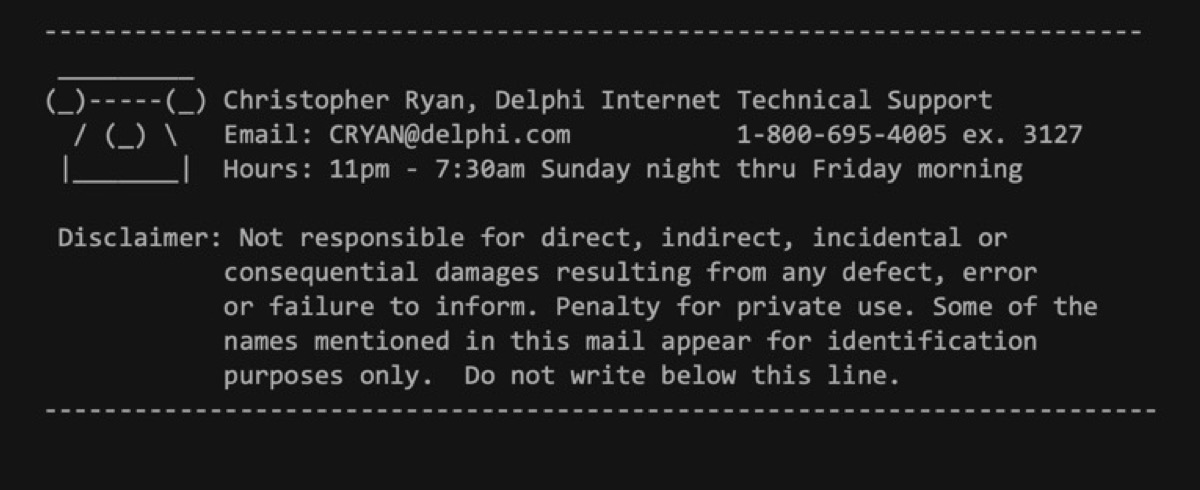Angry Customers
How to Deal with a Bad Call
The following is from the Delphi Member Services handbook 1995. Information to help support agents handle calls.
Why is it important to effectively deal with upset customers?
Fact: 68% of customers will stop service as a result of rude, indifferent or discourteous service. (according to Rebecca L. Morgan, author of the book "Calming Upset Customers.")
Fact: Hostile people will call not because they are mad at you personally, but for a variety of other reasons. (ie. Their expectations have not been met regarding the service, they are already upset by someone/something else, they are frustrated, they feel they can manipulate you if they make a lot of noise or they are embarrassed at not being able to do something.)
Fact: You can't control a caller's behavior but you can change your behavior to avoid causing any more annoyance to the member.

My email signature when I worked at Delphi Internet.
Tips on handling difficult callers
Tone: People respond more to how you say something than what you say. If your voice is annoyed, impatient or condescending, the caller will become angrier. Raising the tone of your voice at the end of a sentence implies a question, not confidence. When your voice sounds assured, they will believe you know what you are talking about and will be easier to calm. It may also help to deepen your telephone voice. Lower voices are perceived as being more mature, confident, and in control.
Speed: Talk slowly, otherwise you will lose your listener and they will become frustrated.
Smile: When you smile, endorphins are released that make you feel better and calmer. The quality and tone of your voice improve when you smile. (advice from Jim Delande)
Breathe: Take a deep breath to calm yourself. When you're upset you lose objectivity. It is important to be calm if you're going to find a solution. (advice from Neovi Vrotsos)
Interrupting: This may induce more anger in an already upset caller. Interrupt with caution by prefacing it with, "I hate to interrupt, but...," or "Pardon me for interrupting.
Empathize: Showing that you understand how they feel, or why they feel that way is important. Empathy is a powerful tool in deflecting a caller's anger. (ie. "I understand your problem," or " can appreciate your frustration.") Always follow empathy with action. (ie. "I don't blame you for being angry...let me see how I can fix this.")
Avoid debate: Avoid causing defensiveness of any sort. Listen to the caller while they blow off steam and then take action.
Take control of the call: It is important to stay in control of the call. Remember that the anger is not directed at you personally, and you may be able to deflect much of its impact by staying calm.
It's nothing personal: The caller is not upset with you, they don't even know you!
Take time out: If you find yourself becoming upset, allow yourself a little time away from the situation. This will give you a chance to calm down before you return. (ie. "Let me check on this, please hold for a minute," or "I need to consult with a (supervisor/colleague), just one moment.") After a particularly difficult call, take a few minutes to collect and relax. Don't go into the next call feeling upset.
End on a high note: Always thank them for calling. The more positive you end the call, the better the member will feel about what took place.
Question and Answer
Q: What should I do when a hysterical member calls?
A: Empathize, state that you want to help, probe for more information, repeat the concern to make sure they understand, ask what they'd like to have happen, summarize actions, let them know you value them as a customer and end pleasantly.
Q: What if the member is ranting and not giving me a chance to explain or ask questions?
A: Use his/her name at the beginning of your sentence. Most people listen when they hear their name. (ie. Mr./Mrs. Jones)
Q: What if a caller is cursing at me?
A: Do not curse back. Compose yourself as best you can and avoid responding to abuse. It shows strength, not weakness, to stay calm in that circumstance.
By Michelle Campanale, Delphi Member Services, 1995.
Sources: Calming Upset Customers: Rebecca L. Morgan. Crisp Publications, Los Altos. 1989.
Solid Gold Customer Relations: Carol Sapin Gold. Prentice Hall, New Jersey. 1983.
How to Talk so People Listen: Sonya Hamlin. Harper & Row, New York. 1988.
